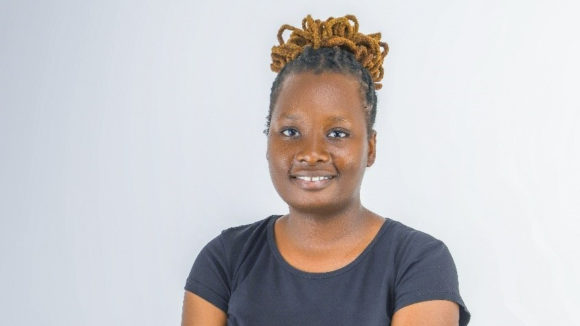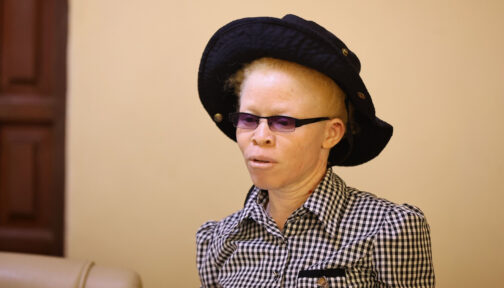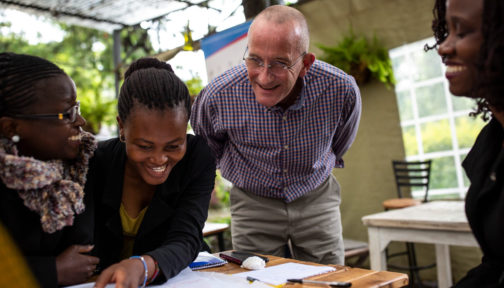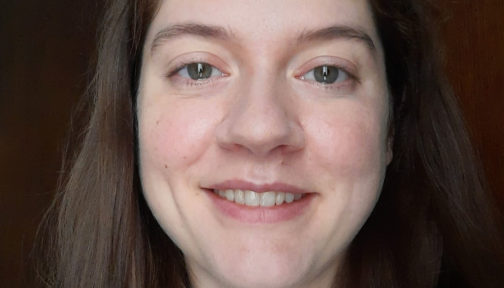Essy Olang: “We need to ensure that the voices of women with and without disabilities are heard”
Essy Olang is a project officer working on the Global Labor Program – Inclusive Futures for Kenya Female Advisory Organization (KEFEADO).
Under the Global Labor Program – Inclusive Futures, Essy is working to improve the consortium’s understanding of how issues around gender and disability intersect to limit the participation of women and women with disabilities in the supply and distribution chains of large agricultural and retail businesses in Kenya. Here she explains why she believes it’s so important that young women are part of the movement to promote women’s rights.
Essy’s story
“As a young woman, I feel like I’m developing as a person and am learning a lot from working within this space. I joined the organisation three years ago when I was still at university, studying a degree in International Relations and Diplomacy. Working at KEFEADO has given me an opportunity to develop and sharpen my advocacy skills through championing women’s rights and mainstreaming issues of gender equality.
“Mentorship is a key part of KEFEADO’s work – the organisation believes that it’s important to share and pass on knowledge to ensure the future of the women’s rights movement in Kenya. It wants more young feminists to be active in this space and supports them to participate in the relevant forums so their voices can be heard. This ranges from the community level right through to high-level international forums like the UN Women’s Generation Equality Forum. The experiences I’ve had of working in the field with KEFEADO and seeing the challenges and barriers young women like me face has made me passionate to keep doing the work that I do.”
Advancing women’s rights
“Women with disabilities are supposed to be seen and not heard, which means they’re often left behind and aren’t able to voice the issues that matter to them. Through our work at KEFEADO we want to change this. We work to call out the people and institutions that have the power to make a difference within our society, to make them accountable and include women and people with disabilities in development processes.
“I’m still in the early stages of my career but I’m proud of being part of the conversation around women’s rights and gender equality. My role at KEFEADO is to implement projects, to network and develop our partnerships to advance gender equality and women’s rights. I also work with institutions at a county and national level in Kenya, to review policies relating to women’s rights and people with disabilities and advocate for improvements, or better implementation and financing of those policies.
“Another important part of my role relates to advocacy, and involves engaging in high-level forums at a national, regional and international level to push forwards our agenda and advance the issues we’re working on.
“From working at KEFEADO, I’ve become more aware of the challenges and barriers that women with disabilities face. But I’ve also seen how we can mitigate those challenges and influence how people view issues of gender and disability. It gives me pride, for example, that I can help influence policy at a local and national level and make a difference to women’s lives in that way.
“In terms of mainstreaming gender equality, I’m also proud that we’re starting to see more women taking on roles of leadership in society – working in political spaces and within business and innovation. It’s encouraging for me to see that change happening – and to see that our movement is making progress.”
Including women with disabilities in work and society
“My hope for the Global Labor Program – Inclusive Futures is that more women will become part of the labour movement and more women farmers will become the companies’ suppliers. I’m also hopeful that the programme will help women with disabilities to become more visible in Kenyan society. For example, women with disabilities aren’t usually included in companies’ adverts and marketing. By working with partners like Coca-Cola and East Africa Breweries Limited, this programme has the potential to help change that and influence attitudes and behaviour so more women with disabilities are included.
“I believe that now is the right time to be engaging on issues of women’s rights and labour rights because women and women with disabilities were so disproportionately affected by the COVID-19 pandemic. If we don’t address these issues now, then when will we? We need to ensure that the voices of women with and without disabilities are heard and that those who hold power within our society engage with them in a meaningful way, so their rights are upheld and protected.
“In my lifetime, I would like to see women live their lives free from violence. I would like there to be equal pay for equal work. As a young woman, I should be paid for my expertise and what I put in, and my pay shouldn’t be based on my age or my gender. I would like to see greater fairness between the roles of men and women in our society, and more considerations put in place for women as the primary care-givers within our society. Overall, I want there to be equality and equity.”

Essy Olang
Project officer, Kenya Female Advisory Organization (KEFEADO)
Interested in delivering inclusive development?
Read our resourcesMore from our people

Lucy Odwar: “Women with disabilities face many challenges”
Lucy is a director in the department of gender, social services and disability inclusion in Homabay County government. Through her work as part of the Homabay County Disability Forum, she supports the Global Labor Program – Inclusive Futures.

Simon Brown: “Our primary focus is on protecting the rights of people with disability in employment”
Simon Brown was global technical lead for economic empowerment at Sightsavers until August 2024.

Ellen Bates-Jefferys: “Women and people with disabilities are an integral part of the workforce, but they are usually undervalued”
Ellen Bates-Jefferys is a research manager at Innovations for Poverty Action – a partner in the Global Labor Program – Inclusive Futures.